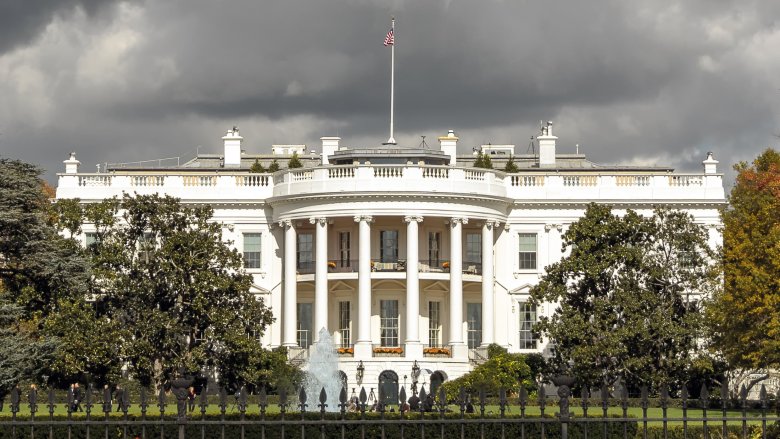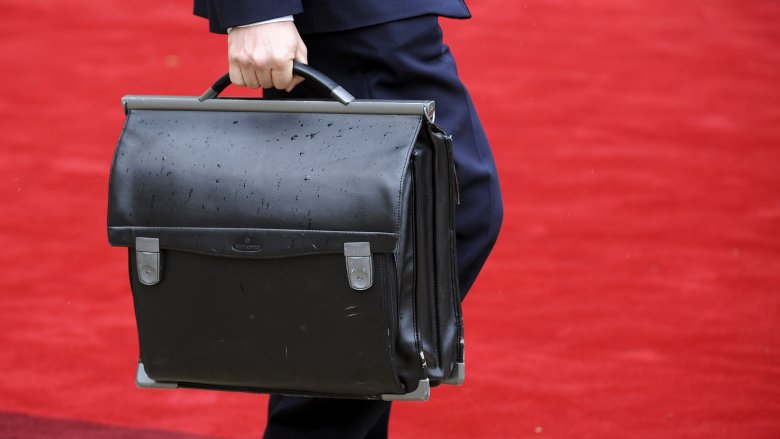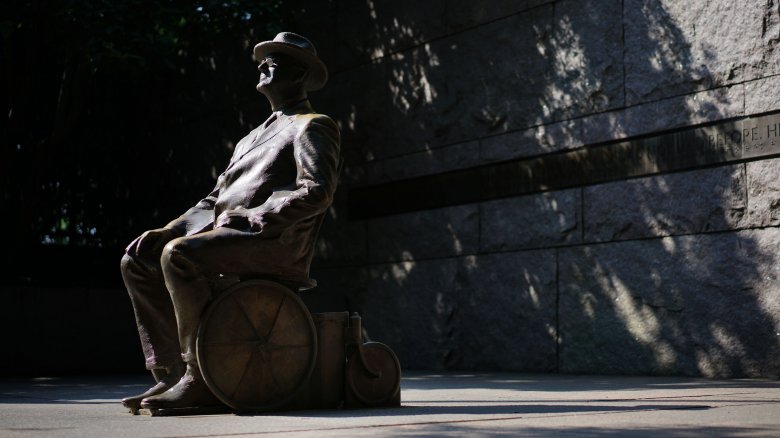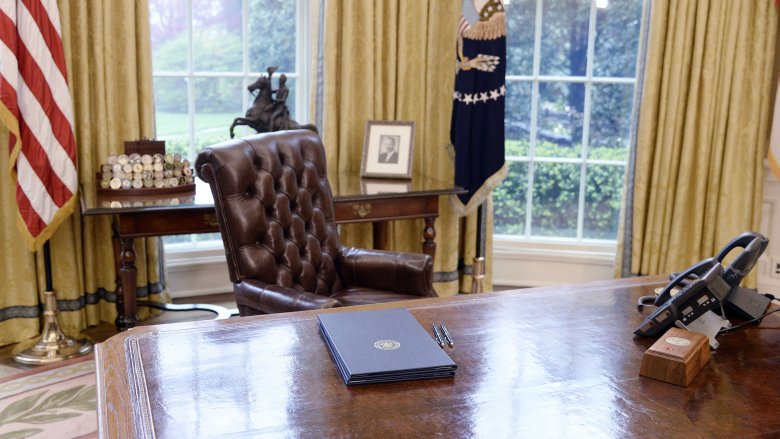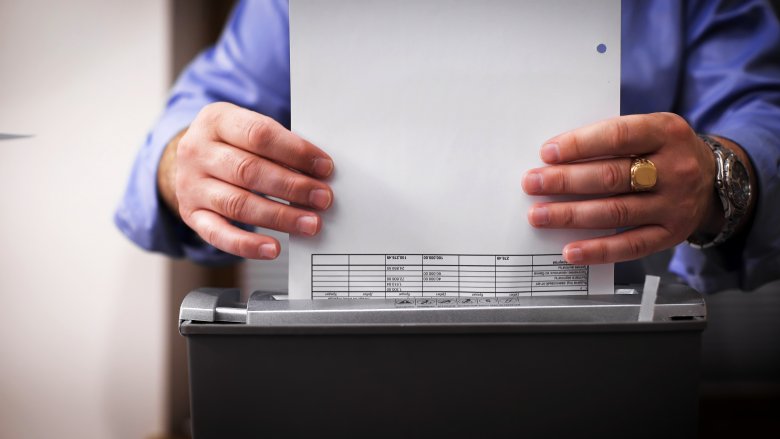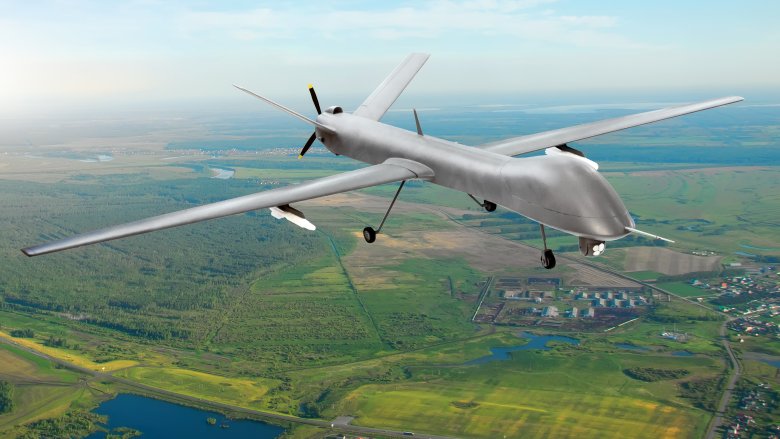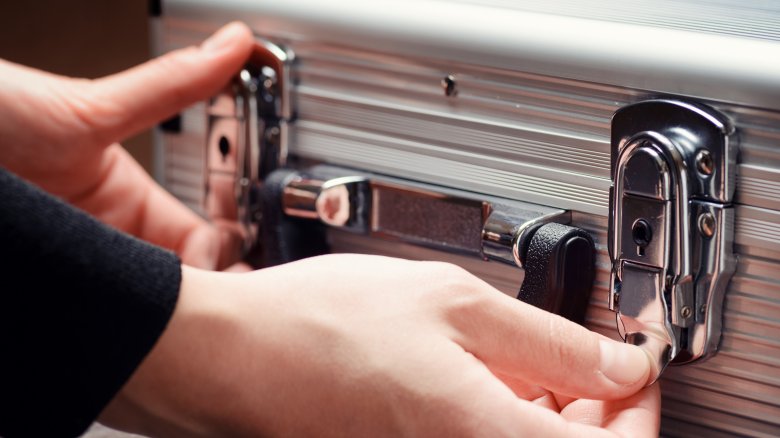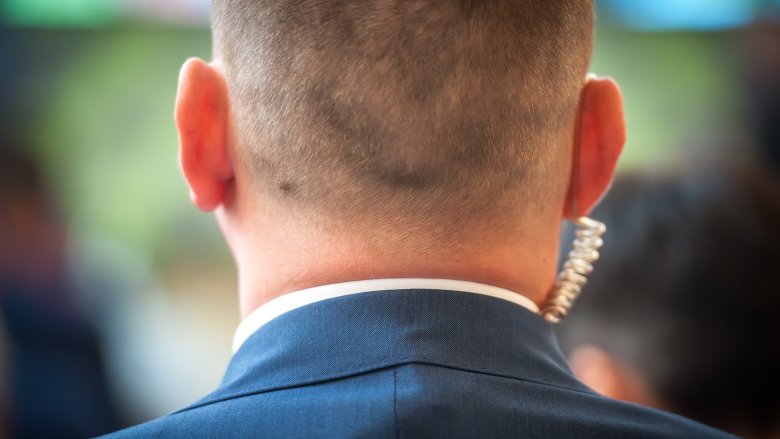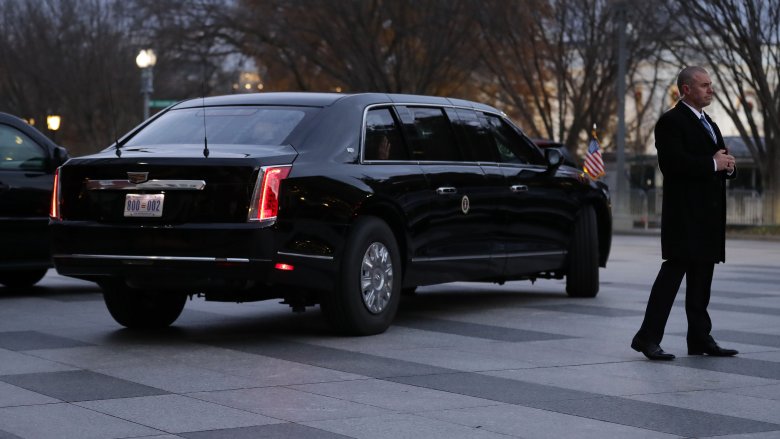Disturbing Secrets The Government Doesn't Want You To Know About The Presidency
The president of the United States is the leader of the free world, the man with his finger on the button, and the guy who pardons the turkey. No matter who holds the office, there isn't really any doubt that it's one of the most important jobs in the world, which naturally means there's going to be some pretty major secrecy built up around it. Some of those secrets are classified, others are more along the lines of "we really hope no one finds out about this." We can't really let you in on any of the stuff in the former category, but the latter one is fair game. And so, because you didn't already have enough reasons to worry about all the disturbing stuff going on in our world ... here's some of the disturbing stuff that's just going on with the American presidency. That we know of.
The nuclear football has literally been dumbed down
"The nuclear football" is that manliest of names given to the briefcase that travels around the world with the president, you know, the one that lets him blow up the world if that's what he feels like doing today. Those close to the president don't call it "the football," though — that name is reserved for us common folk. They call it "the president's emergency satchel," only it's not full of bandages and extra vitamin C, it's full of doomsday stuff.
Now, you'd think the process of launching a nuclear attack would be fairly specialized. Like, the guy in charge of doing it would at least have to take a class or something. A six-week course in Fundamentals of Nuclear Annihilation or "Are you ready to kill billions of people? What you need to know" or whatever. But no specialized knowledge is required, at least not since President Jimmy Carter, who thought the process needed to be simplified to give the president enough time to make critical decisions. The modern football is, in fact, so simple that Smithsonian says one former military aide compared it to a "Denny's breakfast menu." Would you like your enemy crispy or extra-crispy? How about a side of nuclear fallout? So rest easy, America, secure in the knowledge that launching a nuclear war is so simple even a child could do it.
Health problems? What health problems?
The American president needs to be sharp-minded and physically ready to tackle any challenge, from a round of golf to a meeting with world leaders. When we feel like our president is in good health, we feel like the nation is in good health. So that's probably why there has been a long, unofficial tradition of not really discussing the president's ailments.
There's historical precedent for this unwritten policy — according to Newsweek, in 1957 Dwight D. Eisenhower had a stroke that temporarily changed the way he spoke, and people kind of freaked out about it a little because a president who can't communicate is a president who can't perform his most essential duties.
The history of presidents hiding their health problems goes back at least as far as Grover Cleveland, who had a cancerous tumor removed on his yacht under the cover of night. Franklin Roosevelt's congestive heart failure, hypertension, pulmonary disease, and bronchitis were hidden from everyone, even Roosevelt himself. Rosevelt's physician never actually told him how sick he was, which is why he ended up running for a fourth term — a decision that probably led to his death in 1945.
It doesn't seem likely we'll see a lot of change in this policy — unless a president's health leads him to resign, the people around him aren't likely to decide it's in anyone's best interests to admit that the president might not be up to the task of being president.
Presidents aren't kings ... except they sort of are
The reason we don't have a king in America is because the whole absolute power thing really isn't very conducive to liberty and justice for all. And yet, for some very strange reason, the founders built into the presidency some unilateral powers that are frankly sort of terrifying.
John F. Kennedy once said, "Many things can be done by a stroke of the presidential pen," which basically means that the president has the power to just make stuff up and sign his name to it and poof, it becomes law ... ish. The establishment of the Peace Corps, the Louisiana Purchase, Japanese internment camps, and the freeing of slaves were all unilateral presidential actions. Franklin Roosevelt signed so many executive orders (3,721 of them) that his critics called him "Caesar."
So what's stopping the president from declaring that every day shall be Taco Tuesday? Well, according to CNBC, it's basically just down to whatever he thinks he can get away with. Executive orders don't have to be approved by the legislature. To reverse an executive order you'd need Congress to pass a law with a large enough majority that the president couldn't just veto it (good luck!), you'd need to have a court overturn it, or you'd need to wait until another president comes along and cancels the order. So while it's not a great way to build a lasting legacy, it can be super effective for a few years.
Nothing to see here in this pile of incriminating documents...
You've probably heard the term "executive privilege," but the whole concept is a lot more insidious than the name implies. Basically, executive privilege is the power of the president to refuse a request for information. So, if Congress or the judiciary asks for certain documents and the president thinks releasing those documents will threaten national security or hurt his feelings, he gets to say "no."
According to ThoughtCo, most presidents who invoke executive privilege do it out of genuine concern for national security. There are some rules, though — the president has to be able to demonstrate that there's a good reason to withhold the requested information, and if pressed, "It will hurt my feelings" is not a reason that would go over very well with the judiciary.
Executive privilege isn't absolute, either, even when there is a "good reason" — in United States v. Nixon, the court ruled that executive privilege could be overturned by a judge, which is pretty key since that's the only thing that would keep a rogue president from declaring himself totally immune from investigation. Every president has used executive privilege in some form or another, starting with George Washington, and there are probably more good reasons for its existence than bad reasons. But it also seems likely that presidents will continue to use it as camouflage for bad behavior, so it's probably something that good citizens should at least continue to be wary of.
Murder most legal
There are only a few things that American citizens can pretty much take as immutable, unimpeachable truths. First, you will pay taxes. Second, you will experience deep despair over the fact that you have to pay so many taxes. Third, no one is allowed to kill you. Someone might, but no one actually has permission to — with one exception. The president of the United States gets to kill you if he thinks you're a danger to national security. Usually he won't do it in person, but he can order the CIA to do it. Even if you are an American citizen.
But wait, what about the 14th Amendment? In the U.S., if you're accused of a crime the Constitution guarantees you the right to a trial and to know what the hell you're being accused of. According to Huffington Post, though, that constitutional right isn't always given to everyone. In 2011, the U.S. assassinated Anwar Al-Awlaki, an American citizen and Al-Qaeda leader. Al-Awlaki preached that Muslims have a sacred duty to kill Americans, which is not exactly behavior that gets you on the shortlist for a Nobel Peace Prize or anything, but still, critics worry that the assassination set a dangerous precedent.
To be fair, this was the first time the U.S. government assassinated an American without due process since the Civil War (that we know about), so the average, non-Al-Qaeda member American probably doesn't have anything to worry about. Probably. Unless they're living somewhere the U.S. likes to bomb.
Don't cross me or I'll declassify that document
So being president is actually a lot more like those childhood imaginings than we adults always thought it was — the only thing that really keeps a president from going totally mad with power is knowing that the rest of the world will be all, "Holy crap, President So-and-So has gone mad with power!" So we can call that one of the checks and balances that the founders so thoughtfully worked into our system of government.
But wait, there's more ... the president also has the broad power to mess with America's secrets, and make them not secret anymore if he feels like declassifying those documents somehow serves the public good. Or himself. According to Politifact, the president is the commander in chief, so he has the authority to decide whether the dissemination of information constitutes a threat to national security. And although Politifact says the wisdom of such action is really "a judgment call," there don't seem to be any guidelines in place for how the executive might make that judgment call. So really, if the president decides to declassify a document that contains potentially embarrassing information about the guy who got his drive-thru order wrong, there's nothing really stopping him. No one gets to come along and say, "Hey, drive-thru guy is a CIA operative, so we're not going to let you do that." That's comforting, isn't it?
Security clearance is for suckers
If you want to work in the kitchen at a federal agency in Washington D.C., you have to pass a background check. The president of the United States, though, doesn't need to go through a similar process. That's right, you can't make a California roll for a working senator without a security screening and credit check, but anyone with enough votes to become president is essentially passing the background check of public opinion.
The absence of a security clearance isn't a barrier between the president and whatever the hell he wants to find out about any subject, classified or declassified, either. According to the Chicago Tribune, that means the president is in the rather unique position of not being officially qualified to view top secret information and also being able to decide whether top secret information should be top secret information.
It's sort of a matter of practicality — it can take more than a year to obtain a top-secret security clearance, so the president would be fairly ineffective during that critical first year of office if he weren't actually allowed in on government secrets. Still, it seems at least mildly disturbing that we're letting the voters do the same job it usually takes the FBI months to accomplish using sophisticated vetting and investigative techniques. Doesn't it?
It costs a small fortune to protect the president
The Secret Service is tasked with a monumental responsibility — catching those rogue Nigerian princes who are always sending you emails about the money they have stashed away in some Swiss bank account. Besides doing that, they have to stand around wearing sunglasses and looking cool, oh and they also have to take a bullet for the president of the United States, if required.
In fact it isn't just the president the Secret Service is supposed to protect — it's his whole family. And it isn't just at the White House or on official business, it's wherever the heck the president and his family feels like going, whether it's to a meeting with the German chancellor, to an island resort in the Bahamas, or sock shopping at the Dollar General.
Every time the president leaves Washington, seven airplanes go with him: Air Force One, two backup Air Force Ones, and C-17 cargo planes carrying the presidential limo and two backup presidential limos. An additional 22 armored vehicles have to come along as well, for White House staff and all those Secret Service agents. Then there are five helicopters, "a team of Delta commandos," FBI hostage specialists, and the dude who carries the nuclear football around. So if you've ever marveled at how ridiculous the Queen's entourage was back in the Renaissance, let's just say that was nothing compared to the entourage of the American president. All that's missing are the gilded robes.
Bond. President Bond. Or possibly Dracula.
In case you needed proof that the president of the United States is actually a weird supernatural being who somehow infiltrated our world and is now sending intelligence back to the government of Transylvania, here it is: The president travels with a refrigerator full of blood. Yes, it's true, when you become president you are inducted to the office via dark ritual, and afterward you can survive only by drinking the blood of someone with your exact blood type.
Actually no, it's just that the Secret Service is so worried the president will get shot that the presidential limo is stocked with a fridge full of ready-to-be-used blood in case a transfusion is necessary. According to NBC, the limo also carries a range of medical supplies and is, of course, heavily armored — the walls and windows are 8 inches and 5 inches thick, respectively, and the entire vehicle is impervious to chemical attack. The limo can also fire tear gas, create a smoke screen, and eject an oil slick so the driver of a pursuing vehicle will spin out of control, which is what happens in all awesome car chases. Also, the door handles can be electrified so if the pursuer makes it as far as the car, he won't be able to open the door. So really, this is proof not that the president of the United States is Nosferatu, but that he's James Bond. We'll have that martini shaken, not stirred.
